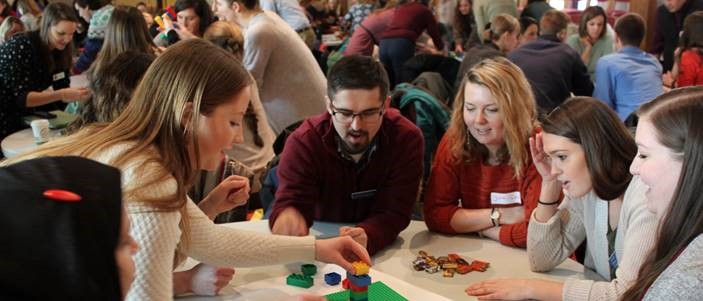
While on a guided tour of Reykjavik a few years ago I asked our guide about the bounty of crime novels written by Icelandic authors. He laughed and said, “Iceland is the safest country in the world; Icelandians write for something to do during the endless darkness of our long, cold winters”. Writing during 2020’s ‘dark times’ may similarly serve to divert UNE’s IPE scholars from virus mayhem. But unlike murder in Iceland, CECE’s product is the real deal. Recent publications report on what UNE has come to be known for –innovations in undergraduate and professional campus-based interprofessional education (IPE). They reflect local, national and global trends that find IPE to be a critical pedagogy that fosters students’ skills in teamwork, communication, shared decision-making, conflict resolution, and collaboration.
The question remains, however, does knowledge gained in the classroom readily transfer to the workforce? Research to date has primarily focused on the outcomes of pre-clinical IPE activities, those taking place in classrooms and as extracurricular opportunities. Much less is known about how IPE impacts future practice – the ‘so what’ of interprofessional learning. Dr. Barbara Brandt, director of the National Center for Interprofessional Practice and Education agrees that as universities expand IPE programming, proof of its enduring value is critical.
Beginning in spring 2019 a team of UNE interprofessional researchers, with support from an APRS Mini-Grant Award, set out to discover more about the ‘so what’ of IPE through an exploratory study investigating whether and how collaborative competencies2 learned in the classroom translated to clinical practice and if not, why not. The study uses a mixed methods design to gather input from UNE alumni who participated in a range of CECE shared learning activities as students. “We’re especially interested in how as active providers these alum use collaborative skills at their practice sites and if not, what are the barriers to their usage,” commented Dr. Shelley Cohen Konrad, the study PI and Director of the Center for Excellence in Collaborative Education. The research team is further interested in whether competencies gained through IPE activities, for example, collaborative leadership, have inspired alumni to advocate for positive change in their respective work environments.
Like many initiatives in 2020, the launch of the study Interprofessional Education: A 5-year Analysis of its Impact on Workplace Practice was delayed by the pandemic. This July, the study team of Cohen Konrad, Kris Hall, Elizabeth Crampsey, and Kira Rodriguez reconvened and is transitioning operations to virtual formats. Hiring of graduate assistants is in process and review of evaluation tools underway. Team allies, comprised of a substantive body of faculty, professional staff, students, and increasingly cross-institutional CECE partners, are eager for the study results. The ‘so what’ of IPE has rested on its assumed benefits to patients and to its potential to improve systems of care. The research team looks forward to advancing knowledge of IPE’s efficacy and to building a stronger pathway between classroom education and clinical practices. And perhaps by the time of publication, the ‘dark times’ will have transitioned to a hopeful future.
1 Amato, C., Cohen Konrad, S., Clarke, L, Husman, C., Bartholomew, A., & Beal, C. (2020). Jumpstarting Cross-disciplinary Collaboration in Undergraduate Social Work Education. Advances in Social Work, 20(2), 1-26.
Mokler, D., Cohen Konrad, S., Hall, K., Rodriguez, K., St. Pierre, S., Thieme, V. S., & Van Deusen, J. (2020). Learning Together: Interprofessional Education at the University of New England. Journal of the American Osteopathic Association. The Journal of the American Osteopathic Association, 120(8), 1-7.2https://nebula.wsimg.com/2f68a39520b03336b41038c370497473?AccessKeyId=DC06780E69ED19E2B3A5&disposition=0&alloworigin=1
